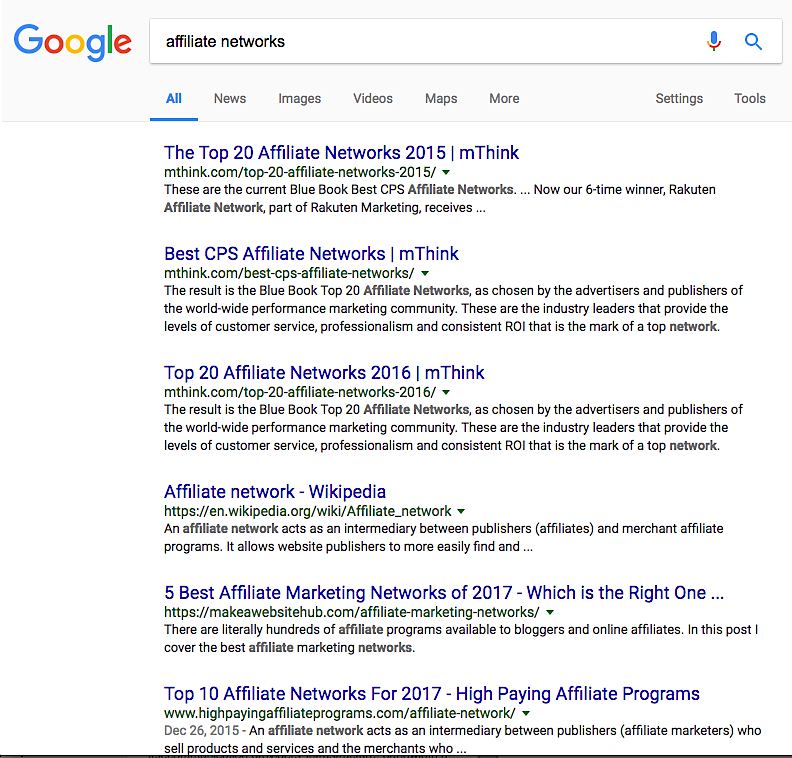So what is this “affiliate marketing” thing everyone’s talking about and how do you go about leveraging it?
First and foremost, affiliate marketing is also known as performance marketing. This is when somebody else is pushing your product.
Here’s an example. I have a background in online education. Chances are if an online education company reaches out to me (and we’ve worked with a few already), I’m going to have a better idea of how to go about marketing that type of company because I have an experiential advantage. I know the nuances of this industry, so it’s not going to take me time to learn how the industry or how this type of business works.
Let’s say my client is a for-profit college and they’re willing to pay $100 per phone call. Well, if I’m confident in my marketing prowess, I might say, “Okay, you pay $100 per phone call and I’ll go ahead and drive those phone calls to you. Let’s work out the terms.”
Maybe I can drive the calls for $25 per call and collect the margin of $75 per call. If I’m able to drive a lot of phone calls from people who are qualified to my affiliate partner, the for-profit college, then we’re going to be making a lot of money. Everyone’s going to be happy.
Book My Free Marketing Consultation
Affiliate Marketing Is No-Risk Marketing
Obviously, this is if I can drive those phone calls. But if I can’t, no one loses, either. The for-profit college isn’t paying me anything unless I drive those phone calls. That’s why affiliate marketing can be very lucrative.
I have a friend who works at a $15 million per year company. They focus strictly on Google AdWords, affiliate marketing, and pushing products. They don’t try to go out of their lane. They don’t try to learn different things. They just specialize in one thing, and they do very well for themselves.
Affiliate marketing is great for a startup or someone who wants to grow faster, who doesn’t want to take the risk and spend money on marketing. If you want other people to drive sales for you, and you only pay them for results, it’s a great deal. There’s little to no risk. Sure, you’re going to have to watch out to make sure you’re not getting big credit cards going through your system, but you should be tracking that anyway.
Related Content: How to Set Up Call Tracking in Google AdWords
Where Do You Find Affiliates?
Start reaching out to each of the affiliate networks out there. There’s a ton of them. Just Google “affiliate networks” or “affiliate networks for health” or whatever you want.

There are different ones in different regions, too, so figure out the regions you’re trying to target. You can find them all on Google.
You can also go to conferences like:
- Affiliate World Europe
- Affiliate World Asia
- Affiliate Summit in Las Vegas
It’s a very simple process. The affiliate management company finds affiliates, and the affiliates push your product or service. All you have to do is pay out the affiliate portion of the sales. The affiliate management company gets a middleman fee for handling and dealing with affiliates and recruiting them. It’s a really good model overall.
Don’t Be Scammed by Bad Affiliates
Let’s say you’re trying to push a product and somebody approaches you and says, “Hey, you know we’re good at this. We can help you with marketing and performance and you don’t have to pay unless we deliver.”
Great, right? Don’t jump the gun too quickly.
Let’s go back to my for-profit college example. “Hey, I’ll drive you calls. You pay me $100 each time.” But what if I drive you a bunch of crap phone calls from India? Then it’s basically just a call center. People are just calling you, but they’re hanging up in one second. Those aren’t qualified calls.
But you signed a contract with me and I’ll come after you if you don’t pay. You’re in big trouble. You don’t have time as a startup to fight these legal battles.
You need strict quality control guidelines when doing affiliate marketing so you don't get scammed. Share on XAnd when you’re paying affiliates, make sure you’re not doing anything earlier than Net 30. That way, if they drive shady traffic or shady sales your way and you run into a bunch of credit card issues, you’re not giving them any money and getting chargebacks on your end.
Book My Free Marketing Consultation
Tracking Affiliate Marketing ROI
If you’re paying for a phone call, you might say, “Okay, the caller has to stay on the line for at least two minutes. That qualifies as a phone call.” That’s a good way to go about measuring it. To track how your affiliate campaign is performing, you can use tools like:
You could even record the calls so that both the agency and the owner of the product can see exactly what’s going on.
When you're doing affiliate marketing, make sure to monitor the ads that affiliates are running. Share on XYou can get into legal liabilities or issues if they’re creating false promises on your behalf. For example, if you’re selling anti-aging wrinkle cream, a bad affiliate might go out there and create fake case studies on poorly designed landing pages that are driving people to your website.
You can be liable for some of those things, so be careful which affiliates you let in. Make sure that they’re driving reputable, quality traffic. The moment you let affiliates in and they start pushing bad traffic, you’re going to get a ton of bad reviews and you’ll be losing money.
Be really careful. Many affiliates only focus on whatever makes them money. They don’t necessarily care if something’s ethical or not. Sure, there are good affiliates out there who care, but the majority of the industry is an unethical race to the bottom.
When you’re trying to recruit affiliates, ideally, the bigger the affiliate the better. Not only are they likely to be more legitimate, they also have bigger email lists and bigger pockets, so they can drive more volume or ramp up quicker.
The Selection Process Goes Both Ways
Not only do you have to be careful about which affiliates you work with, you have to keep in mind that they are discerning partners as well. They’re only looking to work with companies that already have the resources in place to handle high traffic.
For example, if your landing pages, your website, and your marketing isn’t fine-tuned for conversions, you’ll have a hard time getting affiliates to push your offers. These people have to spend money to make money, and they only have so much ad real estate, so they will only push offers to partners that they believe can actually make them money.
It doesn’t matter if you’re selling dog food and someone else is selling sportswear. They don’t care what industry you’re in. All they’re looking at is, “How much time am I spending?” and “What is my return?”
Related Content: 4 Simple But Useful Conversion Rate Optimization Hacks
Getting Started with Affiliate Marketing
If you’re looking to get started in affiliate marketing and you think you might lose your shirt, a really good book to read is Affiliate Program Management: An Hour A Day. It’s by one of the top affiliate marketers out there.

When you’re starting out, affiliate marketing is a great way to go about testing what sticks and what doesn’t if you don’t have a solid product offering yet. You could go to ClickBank and you can push an e-book, like a health e-book, or some type of guide. See how it performs. If it does really well, guess what? You can go make a better product, because you know there’s demand.
From there, you can figure out how you want to go about scaling. Think about how you want to build your funnels. That’s how you create a really solid business around affiliate marketing. Using affiliates and piggybacking off other people’s sites and traffic can help you build your own business at the end of the day.
Most affiliates these days are driving their traffic from Facebook. They’re also doing a lot of arbitrage. As you recruit these affiliates, learn what they’re doing to drive sales and try to replicate the campaigns they run internally as well. That way, you can double dip on sales.
Learn More: How to Create a Marketing Funnel that Generates Sales (Templates Included)
Think of Affiliate Marketing as a Partnership
One of my friends has a company that relies a lot on affiliate marketing, and they treat their affiliates like business partners. They’ll wine and dine them. They’ll actually talk with them like they’re part of the team. It’s better to do that than to operate on your own like a lone wolf. When your affiliates are your partners, everyone’s on the same side.
So if you’re a marketer trying to do affiliate marketing, think about it as a partnership. Visit their offices and try to get as much information as you can from them, as if you’re part of their company. Then you’re actually building a long-term relationship. It’s not as transactional because you’re not making it just about the money.
At the end of the day, if you build a relationship on goodwill, it’s going to last a lifetime. And it will pay dividends for you down the road.
You May Also Like: SEO Strategy for Startups: How to Win in 2023
Book My Free Marketing Consultation
This post was adapted from Marketing School, a 10-minute daily podcast in which Neil Patel and Eric Siu teach you real-life marketing strategies and tactics from their own experience to help you find success in any marketing capacity. Listen to the podcast version of this post below:






